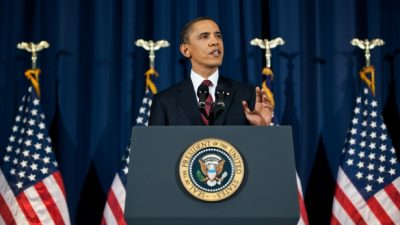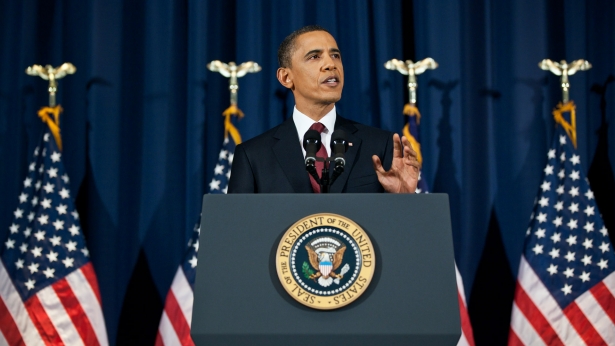 This was a good speech.
This was a good speech.
President Barack Obama is a great communicator, but his address to the nation on the situation in Libya wasn’t a great speech — largely because it didn’t answer critical questions that people in the United States, around the world, and in Congress are asking. The questions remain. Whatever the “bipartisan leadership of Congress” may have heard from the president, most lawmakers weren’t consulted at all.
When NATO’s supreme commander and the main regional commander in Libya are both U.S. generals, why do we think the U.S. isn’t really in control? Just because a Canadian deputy leads day-to-day operations? Why should anyone believe that the administration’s stated goal of regime change is not influencing the U.S.-led military assault against Libya, which already has far eclipsed the UN resolution’s limits of military force only for direct protection of civilians? When the U.S.-led military force already is carrying out what President Obama called “stopping an advancing army” — which has meant destroying planes on the ground, bombing military barracks, attacking airbases hundreds or thousands of kilometers from any civilians — although the UN resolution calls only for protecting civilians, why should we believe that this isn’t about regime change and helping the opposition win the civil war? What will happen when the opposition armed forces attack Serte or Tripoli, including the civilians still living in those cities? And why should we not fear that this third U.S.-NATO war against a Muslim nation in the Middle East and North Africa won’t be with us for a very long time, with casualties rising, money needed for U.S. jobs lost to an endless war, and U.S. standing in the region deteriorating as support for foreign intervention collapses?
Many questions remained unanswered.
Obama spoke powerfully, saying that “some nations may be able to turn a blind eye to atrocities in other countries. The United States of America is different. And as president, I refused to wait for the images of slaughter and mass graves before taking action.” That’s a wonderful notion – the United States is different, we’re exceptional.
The problem is, it isn’t true. The United States of America turns a blind eye to atrocities in other countries all the time. In fact our policies enable those atrocities far too often. Obama spoke of places “where change is fiercely suppressed.” But the only example he mentioned was Iran — an often-discussed possible future target of U.S. military attack. He didn’t mention any of the other places “where change is fiercely suppressed,” such as Bahrain, a regional ally in the Middle East, where U.S. actions – non-military actions – could have real impact.
Do we think that the $67 billion arms deal — the largest in history — the United States just signed off on with Saudi Arabia has nothing to do with Saudi suppression of the nascent democratic uprising there? Do we wonder why the president of Yemen felt confident enough to escalate the slaughter of his own people, unarmed protesters, even after the UN resolution was passed and western warplanes were headed towards Libya — since he knew Washington’s disapproval would never result in military, or even non-military action to stop him? How do we think the people of Bahrain, facing a U.S.-armed absolute monarchy, are supposed to believe that “the United States is different” when they hear Secretary of State Hillary Clinton endorse the “sovereign right” of Bahrain’s king to import troops from Saudi Arabia to suppress democracy protests — just maybe because the U.S. Fifth Fleet is stationed in Bahrain? That’s before we even get to the issue of U.S. active complicity and active impunity provided to Israel — by two administrations — during and after the lethal assault on Gaza that began after Christmas 2008 and killed over 1,400 Palestinians, more than 350 of them children.
What was missing from President Obama’s speech was any discussion of ending the war — not just how will U.S. involvement end, but far more important, how will a ceasefire come about? Who will lead serious negotiations between the two sides in Libya, aiming at a solution not drenched in blood? The UN resolution called for an immediate ceasefire and for negotiations; the African Union (unmentioned in this speech) attempted to send a team of five heads of state to oversee such negotiations last week, but they were denied entry to the country, apparently by coalition forces. The attention to military engagement drowns out the call for negotiations, for accountability, and even for a ceasefire.
I would love to believe that Obama is breaking with U.S. history, that he is creating a really new American foreign policy, based on his understanding that “our own future is safer and brighter if more of mankind can live with the bright light of freedom and dignity.” That would mean acknowledging that our “common humanity” is assaulted when the U.S.-backed, U.S.-armed president of Yemen kills 52 unarmed protesters and injures 200 or more, and that we must take action. It would mean recognizing that the King of Bahrain ceases to be our regional ally, Fifth Fleet or no Fifth Fleet, when he invites foreign troops in to suppress his own people’s democratic uprising. It would mean that our “common humanity” includes the 1.5 million Palestinians struggling to live, not merely survive, under Israeli siege in the Gaza Strip. And it would mean, as he noted, that “the United States, as the world’s most powerful nation, will often be called upon to help.” The help need not be military.
The best “help” will involve ending our own policies that allow, support, and enable oppression and humiliation. It doesn’t mean sending troops — it means not sending or selling arms. It doesn’t mean sending warplanes, it means not preventing the UN from holding war criminals — all war criminals — accountable for their actions.
I would like to believe that the Arab Spring has brought new ideas and new approaches, the sloughing off of old assumptions of U.S. empire, the rejection of a Middle East policy based on the old triad of oil, Israel and stability. But I don’t see it yet. President Obama described how “the course of history poses challenges that threaten our common humanity and common security.” When the U.S. answers that course of history with an entirely new kind of policy based on respect, equality, the rule of law and internationalism, then I will recognize that change is beginning. We’re not there yet.
